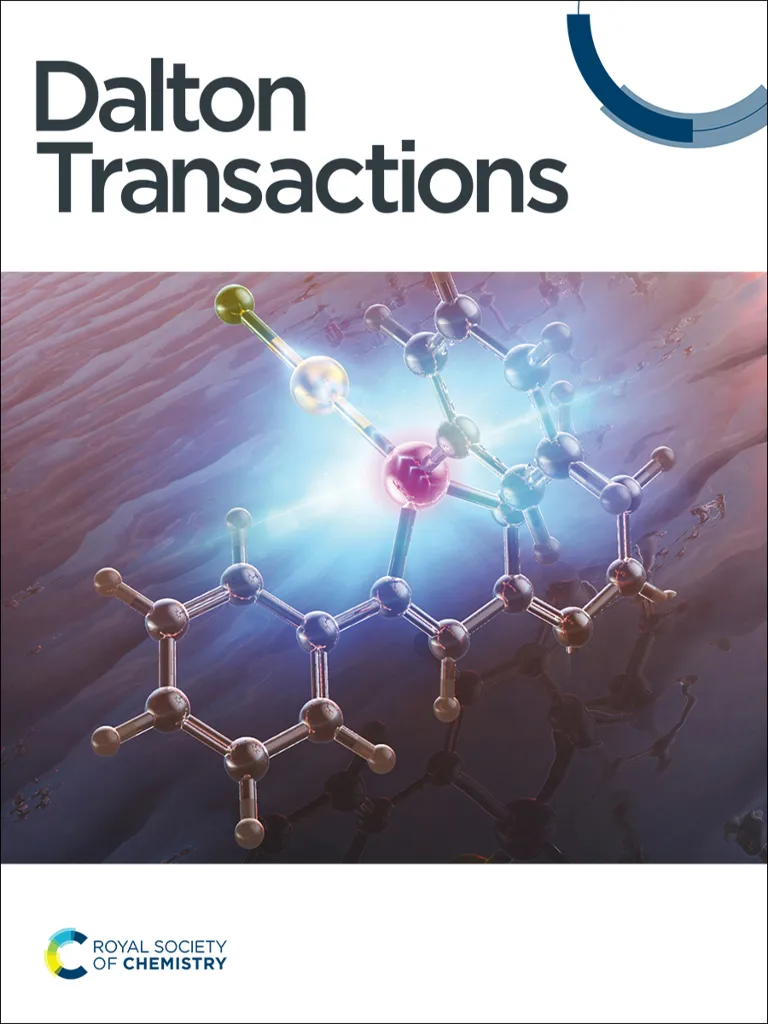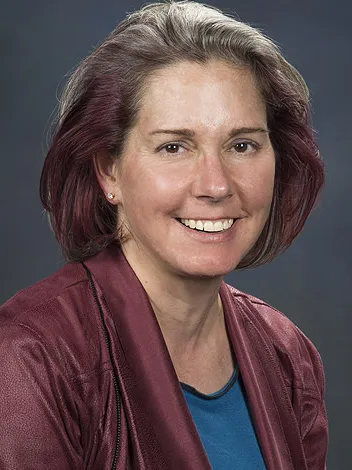Dalton Transactions
The international journal for high quality, original research in inorganic and organometallic chemistry.
Chair: Russell Morris
Open Access: Hybrid

Dalton Transactions is a journal for all areas of inorganic chemistry, which encompasses the organometallic, bioinorganic and materials chemistry of the elements, with applications including synthesis, catalysis, energy conversion/storage, electrical devices and medicine.
ISSN: 1477-9234
Indexed in: Scopus, Web of Science, MEDLINE, PubMed
Journal Impact factor
3.3 (2024)
First decision time (all)
17 days
First decision time (peer reviewed)
23 days
Scope
Dalton Transactions welcomes high-quality, original submissions where the advancement of knowledge in inorganic chemistry is significant. Specific guidance for some areas of our scope is given below.
We encourage work in the area of solid-state, materials and nano-chemistry that includes a significant inorganic chemistry component. Contributions could include the synthesis, characterisation, and applications of new inorganic or inorganic-organic hybrid solids, together with studies of their properties. However, studies of properties of known compounds are only encouraged if there is a clear advance in the inorganic chemistry, and where this forms a major component of both the novelty and significance in the paper.
Studies that utilize well-characterized inorganic and organometallic compounds as catalysts for chemical transformations are welcome but must emphasize the advancement of knowledge in inorganic chemistry. This would include catalyst design and synthesis, structure-activity relationships and/or mechanistic studies.
Work reporting new catalysts for well-studied reactions must contextualize the reported results within the state-of-the-art to demonstrate impact and advancement. Studies that generate ill-defined species in situ and/or report tables of catalytic data without appropriate comparison with existing catalysts will not be considered at Dalton Transactions.
We welcome work on model compounds of metalloenzymes and biologically active inorganic compounds, including reports on their synthesis, characterization and studies of their applications. Spectroscopic or computational work on metalloenzymes, or pure biochemical, biological, or biomedical studies on inorganic compounds are only encouraged if they clearly relate to specific properties of the metals or metalloid elements involved, and significantly further our understanding of inorganic chemistry.
The same applies to papers related to the sensing and visualization of biorelevant metal ions. Such work is expected to have its focus on inorganic aspects and must completely characterize the inorganic compounds involved.
We welcome studies that report new models of reactivity, selectivity, bonding or structure, or new computational methods, that have relevance for the design of subsequent experiments.
This is most clearly demonstrated by the description of testable predictions derived from the results of the reported theoretical work; the tests of these predictions could be contained in the same paper in which the predictions are described. Computational research that merely reproduces experimental data is not normally suitable for Dalton Transactions
Analytical studies on inorganic species are encouraged provided there is significant insight into the chemistry of the inorganic component. Speciation and separation studies that are primarily based around kinetic and thermodynamic models are not considered suitable for Dalton Transactions. Organic sensors in which the primary insight is the synthesis or behaviour of the sensor, rather than an inorganic chemistry advance, will not normally be considered.
Dalton Transactions expects complete characterization of all new compounds/materials by state of the art methods, and that the purity of any compound or material used or reported must be adequately demonstrated (please refer to our Journal Specific Guidelines below for detailed information.
Readership
All researchers working in inorganic and organometallic chemistry, including biological inorganic chemistry.
Information for authors
Want to publish in this journal? Our author guidelines explain how to prepare and submit your article and provide useful information on the review and publication process including transfers, revisions and any article processing charges (APCs) that may apply.
You can read our payments and funding information for further details about APCs, which may apply for publishing open access in this journal, as well available discounts and waivers.
You may be able to publish open access in this journal, with no APC to pay, if your institution has an open access agreement with us. You can use our journal finder tool to check for agreements between us and your institution.
Meet the team



Vadapalli Chandrasekhar
Associate editor
Tata Institute of Fundamental Research Hyderabad
View profile








Simon Aldridge
Oxford University
Hani Amouri
Sorbonne University
Mu-Hyun Baik
KAIST
Jitendra Bera
IIT Kanpur
Claudia Bizzarri
Università di Roma Tor Vergata
Eszter Borbas
Uppsala University
Holger Braunschweig
University of Wuerzburg
Claire Carmalt
University College London
Eric Clot
University of Montpellier
Catherine Constable-Housecroft
University of Basel
Ömer Dag
Bilkent University
Amitava Das
Indian Institute of Science Education and Research (IISER) Kolkata
Jillian Dempsey
University of North Carolina at Chapel Hill
Anjana Devi
IFW Dresden
Rasika Dias
The University of Texas at Arlington
Roman Dobrovetsky
Tel Aviv University
Jairton Dupont
UFRGS
William Evans
University of California
Sujit Ghosh
Indian Institute of Science and Education Research
Harry B Gray
California Institute of Technology
Zijian Guo
Nanjing University
Michael Hayward
University of Oxford
Professor Eva-Marie Hey-Hawkins
Universität Leipzig
Todd W Hudnall
Baylor University
Ilich Ibarra
National Autonomous University of Mexico
Cameron Jones
Monash University
Masako Kato
Kwansei Gakuin University
Takahiko Kojima
University of Tsukuba
Professor Tapas Kumar Maji
Indian Institute of Science Education and Research (IISER) Pune
Jian-Ping Lang
Soochow University
Jennifer Love
University of Calgary
Stuart Macgregor
University of St Andrews
Celia Machado Ronconi
Federal Fluminense University
Ahmed Mansour
Cairo University
Laurent Maron
Universite Paul Sabatier
E Matson
Rochester University
Nils Metzler-Nolte
Ruhr-Universität Bochum
Barbara Milani
University of Trieste
Professor David Morales-Morales
Universidad Nacional Autónoma de México
Professor Ali Morsali
Tarbiat Modares University
Georgii Nikonov
Brock University
Seiji Ogo
Kyushu University
Gerard Parkin
Columbia University
Warren Piers
University of Calgary
Tim Storr
Simon Fraser University
Matthias Tamm
Technische Universität Braunschweig
Jinkui Tang
Changchun Institute of Applied Chemistry
Thomas Teets
University of Houston
Christine Thomas
Ohio State University
Ajay Venugopal
Indian Institute of Science Education and Research (IISER) Thiruvananthapuram
Claudio N Verani
University of Windsor
Wai-Yeung Wong
The Hong Kong Polytechnic University
Lin Xu
East China Normal University
Sally Howells-Wyllie
Executive Editor
Mike Andrews
Deputy Editor
Michelle Canning
Development Editor
Emily Cuffin-Munday
Development Editor
Susannah Davies
Editorial Manager
Gaia De Angelis
Publishing Editor
Debora Giovanelli
Publishing Editor
Helen Lunn
Publishing Editor
Samuel Oldknow
Publishing Editor
Daphne Houston
Editorial Assistant
Huw Hedges
Publishing Assistant
Sam Keltie
Publisher
Read this journal
Communication
A palladium thiolate-SNS complex-catalyst for Mizoroki–Heck cross-coupling
Frontier
Metal-based complexes with antiplatelet properties: antagonists of the platelet-activating factor receptor (PAFR) and other aggregating agents
Communication
Isolation of the parent triplet titanocene via NHC stabilisation
Paper
Macrocyclic control of electron transfer to high valent uranium in heterobimetallic complexes
More from this journals
Contact the journal team
We're here to help. Contact the journal team if you have any questions about publishing your paper with us.
Sign up for journal email alerts
Get table of contents alerts and notifications about calls for papers, themed issues and more.
